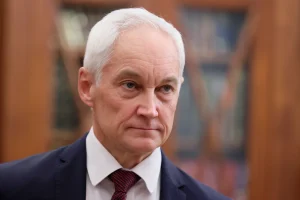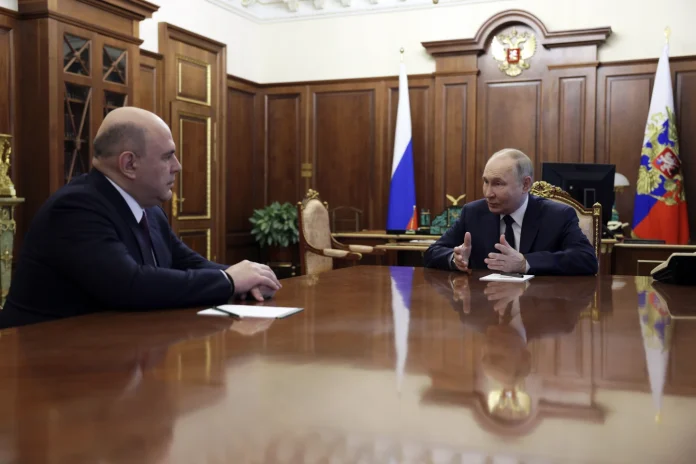The Russian government announced a top-rank reshuffle, but no radical ministerial appointments were made, Russian media reported.
Reports of the ministerial appointments appeared in Russian media on Sunday. As follows from the decree of Russian President Vladimir Putin, no radical changes have taken place. Putin nominated Andrey Belousov, former first deputy prime minister Mikhail Mishustin, to the Federation Council as the new defence minister.
New Defence Minister
Andrey Belousov, former presidential aide for economic issues, would replace Sergei Shoigu. The latter, in turn, was appointed the new secretary of the Russian Security Council. The Federation Council will consider his appointment on May 14.

Presidential spokesman Dmitry Peskov explained Putin’s decision to appoint a civilian official as head of the Defence Ministry as the need for innovation.
A civilian becomes the head of the Defence Ministry. Whether he has a military rank is not the main thing.
Putin’s surprise appointment of Belousov as head of the defence ministry indicates that the president intends to introduce a major change of approach to the war in Ukraine, according to Financial Times. The government intends to tighten control over record defence spending, which totals 10.8 trillion rubles (about $118.5 billion) for 2024.
He’s absolutely not corrupted. And that’s going to be very different from what we have now in the ministry of defence. Shoigu and everyone around him were really commercial guys. Belousov (…) won’t pretend to lead the army like a general with all these medals. He’s a workaholic. He’s a technocrat. He’s very honest, and Putin knows him very well.
The son of a prominent Soviet economist, Belousov worked in academic circles before joining the government in 1999. He subsequently held various positions, including Minister of Economic Development, Putin’s economic adviser, and First Deputy Prime Minister.
Belousov consistently advocated a strong government role in the economy and the promotion of growth through public investment, low interest rates, and soft fiscal and credit policies.
Other ministerial appointments
Boris Kovalchuk, son of Yury Kovalchuk, deputy head of the control department of the presidential administration, became the new head of the Accounts Chamber. The position had been vacant since November 2022, when former Finance Minister Alexey Kudrin stepped down as chairman and went to work for Yandex.
All 21 ministries will reportedly continue their work. Putin also shifted the Federal Service for Military-Technical Cooperation out of the defence ministry’s subordination. Now, it would report on its activities directly to the president.
I expect my colleagues at all levels of the executive branch to be focused, collected, working for results.
Former Defence Minister Sergei Shoigu took up the post of secretary of the Russian Security Council, according to a presidential decree. Previously, Nikolay Patrushev, who headed the Federal Security Service (FSB) from 1999 to 2008, held that position. The Council is a constitutional-advisory body that prepares presidential decisions on issues of ensuring national defence and protecting the country’s sovereignty. It is chaired by Putin as president of Russia.
Dmitry Patrushev, who served as head of the Agriculture Ministry, is under consideration for deputy prime minister.
Deputy Prime Ministers
The prime minister will still have 10 deputies, one of whom will hold the status of first deputy prime minister. However, the deputy prime minister, who simultaneously heads the Ministry of Industry and Trade, will no longer be in place.
With the departure of certain acting deputy prime ministers, redistribution of powers among the government is expected. The State Duma Energy Committee recommends approving Alexander Novak as Deputy Prime Minister of Russia. It also suggests Sergey Tsivilev as Minister of Energy.
Alexey Overchuk, Marat Khusnullin, and Yury Trutnev are likely to retain their positions as deputy prime ministers. The latter will continue to oversee the development of Russia’s Far East. According to the government, Prime Minister Mikhail Mishustin will approve the final decisions on the deputy prime ministers after the State Duma considers the candidates and consultation with the president.
